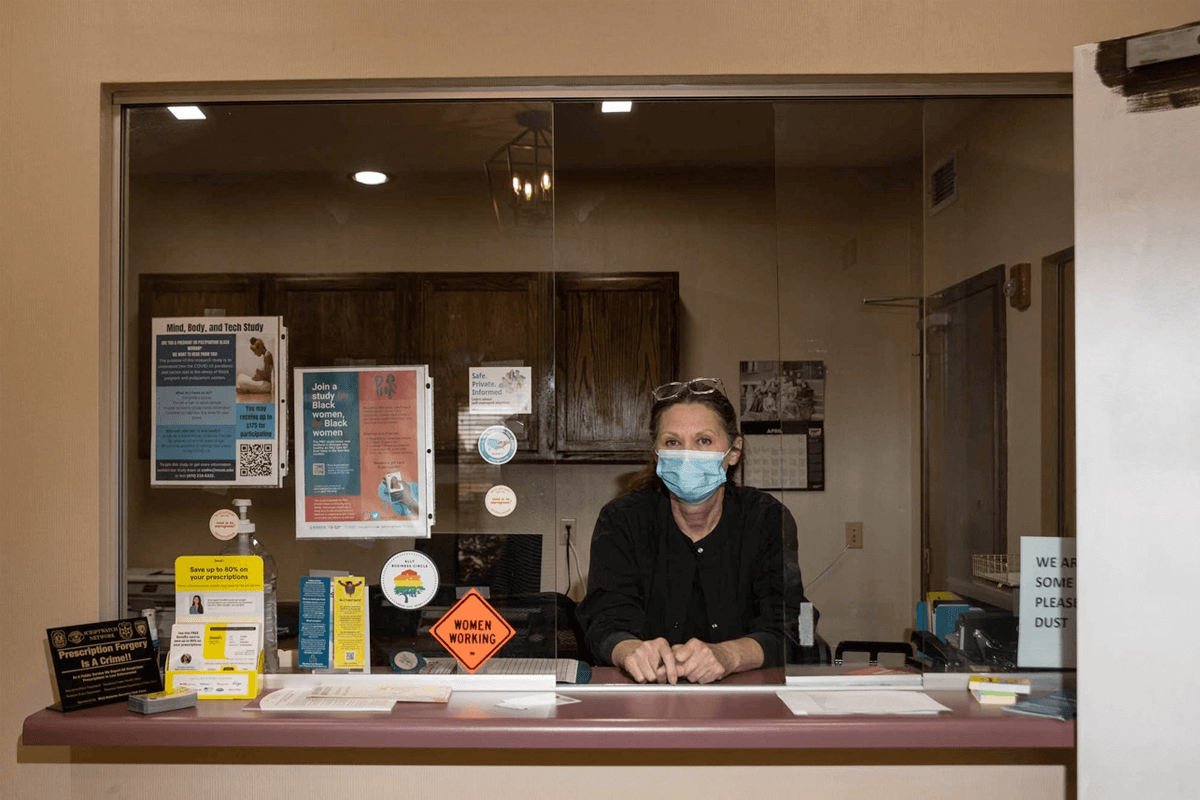
Image: West Alabama Women’s Center, Tuscaloosa, Alabama
Former abortion clinics in “red states” are trying to pivot to other services after Dobbs. But they’re finding it’s not so easy.
Patients arriving for an appointment at the West Alabama Women’s Center one year ago would brave a gauntlet of chanting protesters, skirt an idling police car, take seats in a crowded waiting room and wait for one of the clinic’s dozen busy staff members to help them terminate a pregnancy. Over the clinic’s nearly 30-year history, visits also included the risk of being shot, bombed or rammed by a vehicle. But when Abigail arrived on a Tuesday morning in April, nearly 11 months after the fall of Roe v. Wade, the parking lot was so quiet you could hear the clinic’s windchime tinkling faintly in the breeze.
She first tried her student health center, but she was told it would be a three-month wait for an IUD and that they only had male doctors on staff…. She then contacted the county health department — the sole recipient of federal family planning funding in the area — and learned it would be a four-month wait to see a male doctor and a six-month wait to see a woman. Googling around led to her the West Alabama Women’s Center, which offered her a next-day appointment.
When Roe v. Wade was overturned in 2022, the West Alabama Women’s Center immediately pivoted to the kind of non-abortion services that Abigail came for that day: contraception in her case, and in others, prenatal care, miscarriage management and follow-ups for the at-home and out-of-state abortions its providers know are still happening. In a state notorious for a crisis-level lack of women’s health care services, the center has seen no shortage of need. Open five days a week, they see as many in-person patients as they can each morning and hold back-to-back telehealth appointments in the afternoons for people across the state who can’t make the trip to Tuscaloosa.
But staffers there are finding that providing comprehensive women’s health care services post-Roe is almost as difficult as providing abortion services before the state’s ban took hold… [Women] are still terminating pregnancies by traveling to other states or ordering medication online. The clinic often sees women who are trying to figure out how far along they are in their pregnancies so they can come up with a travel plan to obtain an abortion, and women who have already had the procedure elsewhere and need additional care…. The clinic is struggling financially, too. Known for decades as primarily an abortion provider, the West Alabama Women’s Center has struggled to get the word out that they’re now providing other care and worked to build a new patient population from scratch, mainly through word-of-mouth. Facing these challenges, the clinic and others like it in other red states across the country are barely holding on. If they disappear, women who already live in dangerous maternal care deserts could lose a lifeline….
The operations director at the clinic estimates it could have only a few months left before it has to close, even as patients continue to stream through their doors from 100, sometimes even 200 miles away….“This is life and death to us,” she said. “I want us to be able to do abortion, obviously. But there’s so little care of any type here — trans care, HIV care, basic preventative health care — that we still need to be here. There is just as much of a lack of access for everything else as there ever was for abortion.”
SOURCE: Politico, by Alice Miranda Ollstein, 29 May 2023, Photo by Charity Rachelle for Politico



